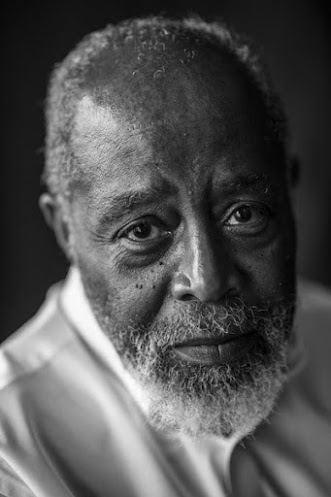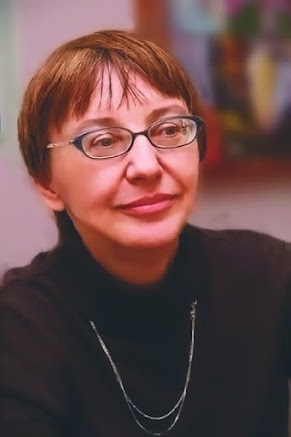Eccentric Days of Hope and Sorrow, Ali Kinsella and Dzvinia Orlowsky, translated from the Ukrainian
written by Natalka Bilotserkivets
Lost Horse Press, 2021
2022 Griffin Poetry Prize • International Shortlist
interviewed by rob mclennan
The 2022 Griffin Poetry Prize will be announced on June
15, 2022.
Ali Kinsella has been
translating from Ukrainian for nine years. Her published works include essays,
poetry, monographs, and subtitles to various films. With Ostap Kin she translated
Vasyl Lozynsky’s chapbook The Maidan After Hours (2017). She won the
2019 Kovaliv Fund Prize for her translation of Taras Prokhasko’s Anna’s
Other Days. She holds an MA in Slavic studies from Columbia University,
where she focused on Eastern European history and literature. A former Peace
Corps volunteer, Ali lived in both Western and Central Ukraine for nearly five
years. She now lives in Chicago, where she also sometimes works as a baker.
Dzvinia Orlowsky is the author of
six poetry collections, including Bad Harvest (2019), a Massachusetts
Book Awards ‘Must Read’ in Poetry. She is a recipient of a Massachusetts
Cultural Council Poetry Grant, a Sheila Motton Book Award, and a co-recipient
of a 2016 National Endowment for the Arts Literature Translation Fellowship. She
is a contributing poetry editor to Solstice Literary Magazine and
founder of Night Riffs: A Solstice Magazine Readings & Music Series.
She teaches poetry and creative writing at Providence College, and is a
Writer-in-Residence at the Solstice Low-Residency MFA in Creative Writing
Program.
Natalka Bilotserkivets has published five
volumes of poetry. Her work, known for lyricism and the quiet power of despair,
became a hallmark of Ukraine’s literary life of the 1980s and 1990s. The collections
Allergy and Central Hotel were Books of the Year in 2000 and
2004, respectively. Still, the majority of her oeuvre remains unknown in the
West. She lives and works in Kyiv.
I’m curious about the process of two translators on a
single work. What was your process of working together, and how did this
particular project emerge?
Ali Kinsella: This project was very new for me in that I hadn’t ever worked so
intensively on poetry, nor had I ever collaborated so thoroughly with another
translator. We agreed that I should do the first, quite literal drafts and that
Dzvinia should come in after me and shape them into something more resembling
poems. This approach was sort of obvious, given our respective strengths. Each
draft then had at least one collaborative editing session over the phone, but
sometimes three with extra notes emailed back and forth. As we have now been
working together for over two years, we can work much faster. In working with
Dzvinia, I have really had a master class in poetry and I can anticipate some
of her critiques and concerns better—or at least I’d like to think so.
Dzvinia Orlowsky: You definitely
do, Ali! And thanks to Ali’s careful attention to detail, I’ve broadened my
understanding and appreciation of unexpected tense shifts, gender fluidity, and
the nuances of the Ukrainian language.
With respect to our collaborative process, Ali summed it up
perfectly. I would only add that in finding our complementary strengths as
translators, we also had to develop a sense of trust for each other as readers.
I lean more toward figurative rather than literal interpretations—leaps of
faith! So I tended to look for metaphors where maybe Natalka didn’t intend
them. Ali favored staying closer to the original text and its literal meaning. We
also interpreted several of the poems in this collection differently. For
example, Ali understood Wolf Wine Bar to be about climate change, whereas
I saw it as a poem about war (note: this was prior to Russia’s February
invasion). Honestly, it could be read both ways. This kind of discussion made our
project that much more challenging and exciting. Natalka gave us the freedom to
interpret her poems as we felt them, but we were also able to reach out to her
for help on poems that touched on subject matter we weren’t familiar with.
I suppose a question I should ask Ali, given your
previous experience of translating works from Ukrainian, how did the experience
of translating Bilotserkivets’ work differ? Were there elements you needed to
approach through translation that were unique to her poetry?
AK: Translating
poetry is very different from prose, mainly because the art form is so compact.
An obvious sacrifice that must often be made in poetry translation is rhyme,
but beyond rhyme, there are meter, sound, imagery, and meaning. Not all of
these elements can be preserved and choices have to be made. Of course, there
are other considerations when translating prose—tone, register—but the endless
blank page leaves so much room for compensation. If a joke or pun doesn’t work
where it was in the original, throw one in somewhere else!
Most
of the poems included in Eccentric Days were originally written in free
verse, but there were a few that we “converted” since we were sure we couldn’t
preserve the rhyme scheme and have the poem still come off as serious. So, the
real new challenge for me as someone who came from primarily translating prose,
was paying so much attention to sound (especially since musicality is such an
important element to Bilotserkivets), lyricism, and image. Dzvinia was more
willing than I to consider metaphorical rather than literal meaning in order to
benefit the poem as a whole, and I’m very grateful to her for helping to lead
me away from strict literalness (which isn’t exactly how I’d categorize my
prose translations, but by comparison they certainly approach verbatim).
The collection is an impressive size, in no small part
to the decision to include Natalka Bilotserkivets’ original writing in
Ukrainian alongside your translations. For such a hefty work, what was behind
the choice to include the work in its original form?
AK: The book came out as part of a bilingual series. The publisher,
Christine Lysnewycz Holbert, had a minimum length for us, but put no cap on the
number of poems or quantity of miscellanea. Still, we only included the poems
that we wanted to be a part of this collection; this was far from an exercise
in throwing everything at the wall to see what stuck.
DO:
Many literary magazines and journals publish the original text
alongside the translated work. In addition to other advantages, it grants
ocular proof that such a poem exists! As
a translator, I welcome the presence of a foreign language on the page. In our
book, you’ll see that the poems mirror each other fairly consistently. There
are exceptions, however. For example, in our translation of Natalka’s poem
“Nature,” the last stanza is elongated in comparison to the original. The
poem’s intention and meaning hasn’t changed; but the artistic decision, here, is
to slow the pace—to emphasize the speaker losing those cherished and no longer
audible, sensory sounds. We wanted to hold that line, the word “secret,” in
suspension before resolving to “tears, laughter.” After all, if it’s given up too
easily, it never really was a secret…
Given the way the Ukrainian language has shifted and changed over
the years, I feel Lost Horse Press’s bilingual books provide an invaluable
record of Ukrainian-language poetry at specific time in its literary history. I
appreciate being able to switch between Ukrainian and English—with the end goal
of improving my Ukrainian.
Was there a difficulty, through your translations, of
maintaining what you referred to as her “ungendered present tense”?
AK: Well, the specific problem of gender is an issue having to do
with Ukrainian grammar that doesn’t exist in English. Ukrainian is a highly
inflected language with cases that give us noun and adjective declensions,
verbal conjugations, and gender, which affects nouns, adjectives, and verbs in the past tense. This might
make Ukrainian sound rigid, but the words’ taking all these modifications
actually means speakers can be quite creative and also leave many things—like
the sentences of subjects—merely implied. (Perhaps you, too, remember that
eye-opening day in Spanish 101 when you learned you could just say, “tienes,”
to mean you and have.) So, while the past tense has
often felt too restrictive for Natalka as it forces her to pick a gender for
her speaker (something English speakers never face), the present tense allows
her to get away without using pronouns (something English speakers can’t
usually pull off).
There were times when we
were, in fact, made to choose either “he” or “she,” but mostly we found other
ways to sidestep getting boxed in—“you” is the most obvious choice, and one
that Natalka herself often makes. On the topic of grammatical gender in
language, I do remember just barely catching a big mistake before the book went
to press. Natalka has a small little untitled poem that punches above its
weight class that starts, “Life is simple and quiet / and I love it.” I had
mistakenly translated the pronoun “it” here as “he” (they are the same in this
case), which completely changes the
poem and actually in that state we had considered discarding it. But this is
the challenge of a non-native speaker who has to actively remind herself that
the “hes” and “shes” she sees are often just “its.”
DO:
I’d say Ali has answered
this question thoroughly, and I feel lucky that I didn’t have to wrestle with
these considerations to the extent that she did.
In terms of making poetic/thematic
choices while maintaining an “ungendered present tense,” I agree—particularly early
on, this created some difficulty for us because, as Ali notes, if we got the
pronoun wrong, we could easily miss the point of the poem. And we didn’t want
to overwhelm Natalka with picky, poem-to-poem questions. Early on, I spent too
much time making sure I got individual poems “right.” I had to remind myself
what I know as a poet shaping my own work into a collection: each poem informs the poems that follow it. By
the time Ali and I were half-way through our manuscript, we had a better sense
of its constellation and were able to resolve gender and tense questions more
quickly. As for Natalka’s proclivity toward using the present tense, that worked well for us. It contributed
to a sense of immediacy and intimacy which we strove to capture in her work.
Since the completion of Eccentric Days of Hope and
Sorrow, have there been any further translation projects the two of you
might consider collaborating on, whether Natalka
Bilotserkivets’ work or anyone else?
DO: We are always interested in Natalka’s
work and have published several co-translations of her newer poems. In
addition, Ali and I are very moved by the work of a Lviv-based award-winning
poet, translator, and fiction writer for children, Halyna Kruk. We have been
translating some of her poems. Serendipitously, this past spring Lost Horse
Press approached us about publishing a collection of her poetry. I was at AWP
at the time we signed the contract. Look for that book in 2024!










